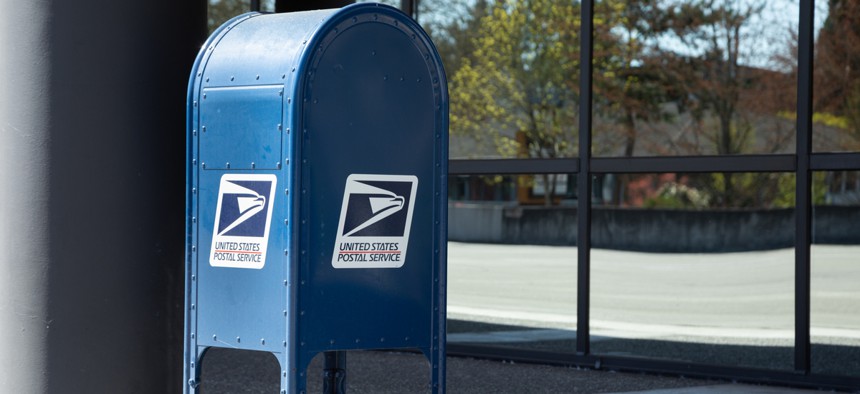Lawmakers Express Concern Over How USPS Will Handle November Election

The U.S. Postal Service handles all mail-in ballots for elections. Shutterstock
With more voters choosing mail-in ballots, lawmakers want to know how the U.S. Postal Service is preparing for November.
Congressional lawmakers are raising concerns over how the U.S. Postal Service plans to handle the November election, amid reports of significant mail delays, recent policy changes at the agency, and primary elections marked by missing absentee ballots.
The coronavirus has led millions of voters across the country to turn to mail-in ballots for primary elections, a trend that is likely to continue into November if the pandemic rages on into fall.
In a recent letter to Postmaster General Louis DeJoy, top Democratic senators including Cory Booker, Chuck Schumer, and Amy Klobuchar requested that USPS produce a “detailed plan” as to how they intend “to overcome potential issues” resulting from the influx of mail-in ballots, absentee ballot applications, and voter registration forms.
“As the number of COVID-19 cases continues to rise, Americans have already begun to turn to the Postal Service in unprecedented numbers as a safe alternative to exercise their right to vote,” the lawmakers wrote. “While problems with vote-by-mail can result from a variety of factors, staffing shortages and delays at Postal Service processing facilities during the COVID-19 pandemic may lead to delays that harm the use of election mail … If mail ballots arrive late and are uncounted, some voters may be disenfranchised.”
The letter, which was first obtained by Vox, requests that the postmaster general provide Congress with updates on staffing plans, mitigation efforts for potential coronavirus outbreaks at USPS facilities, and coordination efforts with state and local election officials.
A USPS representative confirmed that the agency received the letter and said the agency is “committed to fulfilling our role in the electoral process when public policy makers choose to utilize us as a part of their election system.”
“We employ a robust and proven process to ensure proper handling of all election mail, including ballots,” they said. “As we anticipate that many voters may choose to use the mail to participate in the upcoming elections due to the impacts of the COVID-19 pandemic, we are conducting and will continue to proactively conduct outreach with state and local election officials and Secretaries of State so that they can make informed decisions and educate the public about what they can expect when using the mail to vote.”
June’s primary elections put a host of problems on display when mail-in ballots went missing and uncounted, never arrived in voters’ mailboxes, and were returned back to senders after Election Day.
The number of people casting mail-in ballots increased dramatically in many places in June—Nebraska, for example, saw 80% of its primary ballots cast by mail, compared to the usual rate of around 25%. In Pennsylvania, the number of requests for primary mail-in ballots rose to nearly two million of the state’s 8.5 million voters. About 130 million voters are expected to cast their ballots in November, though the number of them that will choose to vote by mail is still unclear.
President Trump has repeatedly decried efforts to expand voting by mail, saying that the practice will lead to widespread fraud as ballots get stolen or copied by malicious foreign agents. Proven cases of fraud with mail-in ballots are exceedingly rare.
Both the Centers for Disease Control and Prevention and other public health officials say that election officials should prepare for a surge in mail-in ballots as voters decide to stay home and avoid crowds at polling places.
If that surge occurs, some fear that the financial situation of the Postal Service—which is dire in normal times and has been made worse by the pandemic—will cripple its ability to fully serve the number of voters who want to use it in November. A representative from USPS said that “the Postal Service’s financial condition is not going to impact our ability to process and deliver election and political mail … including any additional volume that may result as a response to the COVID-19 pandemic.”
While USPS reassures the public that the agency’s finances will not impact the election, observers are alarmed by certain recent policy changes the agency has made to mail delivery schedules. USPS announced a plan to adjust the way they sort and deliver mail with the goal of “making the USPS financially solvent.” The proposed policies will affect mail delivery times and result in delays in many instances.
High-ranking House Democrats wrote a letter to the postmaster general on Monday in response, saying that while they “share the goal of ensuring the Postal Service’s solvency,” the language of the changes compare USPS to “a private company concerned only with the bottom line, rather than the constitutionally mandated public service that it is.”
“It is vital that the U.S. Postal Service not reduce mail delivery times,” the lawmakers wrote. “While these changes in a normal year would be drastic, in a presidential election year when many states are relying heavily on absentee mail-in ballots, increases in mail delivery timing would impair the ability of ballots to be received and counted in a timely manner—an unacceptable outcome for a free and fair election.”
Emma Coleman is the assistant editor for Route Fifty.

NEXT STORY: Politicians and Business Interests Pushed Health Officials Aside to Control Reopening. Then Cases Exploded.






